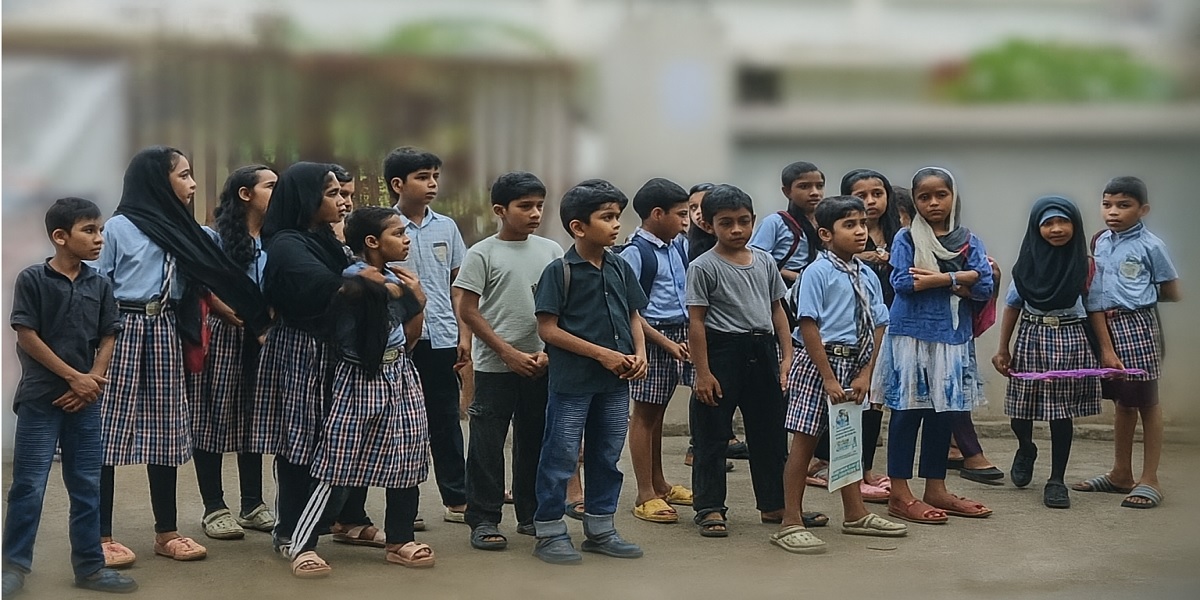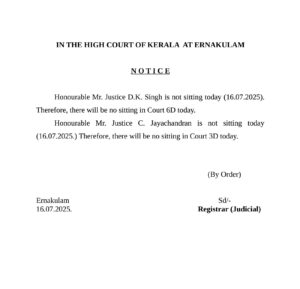Published Jul 17, 2025 | 9:00 AM ⚊ Updated Jul 30, 2025 | 6:31 PM

The Lakshadweep administration has banned the teaching of Arabic and Mahal languages, and shut down two government schools.
Synopsis: Hundreds of children in Lakshadweep have been denied their right to education for over a month following the abrupt closure and merger of two government schools in Lakshadweep, including the well-performing Mechery Government Junior Basic School on Androth Island. The administration’s move, using provisions of NEP, has sparked protests from parents and local bodies.
Fathima Nezra, carrying her Barbie-pink printed bag and unicorn snack box, was ready for school on 9 June, the day schools reopened in Lakshadweep after the summer break.
She was set to join Class 3, excited to see her new classroom, meet her teachers and friends, and left home with her father, Musthafa Avamada. But when they reached Mechery Government Junior Basic School on Androth Island, they found the gate shut and under lock and key.
Like Nezra, hundreds of children stood helpless outside their schools.
For the past 37 days, they have been denied their right to education, guaranteed under Article 21A of the Indian Constitution and the Right to Education Act, 2009.
The closures follow the Lakshadweep administration’s decision to ban the teaching of Arabic and Mahal languages, and to shut down two government schools – disrupting the foundational education of nearly 350 students and leaving their academic future in limbo.
Nezra’s father, Musthafa, who is also a member of the School Management Committee, voiced strong concern over how the closure was handled.
“They didn’t even put up a notice at the school or inform us through the parents’ WhatsApp group,” he told South First. With no communication from the authorities, including the principal, parents were left in the dark about the sudden school merger and auto-transfer of students.

The Kerala HC has deferred the hearing on a petition related to the closure of the Junior Basic School in Mechery, Androth Island, Lakshadweep.
Musthafa said the administration has not appointed new teachers and instead appears to be cutting down the teaching staff.
“There are many qualified people here, and now they are voluntarily teaching our children in a rented space near the Jumah Mosque,” he said. “This isn’t a permanent solution, but they stepped in so the kids wouldn’t miss their academic days and syllabus portions.”
He emphasised that Mechery Government Junior Basic School on Androth Island was one of the best in Lakshadweep, known for good infrastructure, strong academic performance, and being the only Malayalam-medium school in the region.
“Most parents here are daily-wage workers. They can’t afford private vehicles to send their kids to far-off schools,” he added. “Since Praful Khoda Patel took charge as Administrator, education has taken the worst hit in Lakshadweep.”
While the National Education Policy (NEP) 2020 supports merging schools with low enrolment – typically those with fewer than 50 students – the decision to shut down JB School in Mechery defies logic.
The school has over 100 students in its lower primary section and far better facilities compared to Government SB School Edachery, which lacks even basic infrastructure like a proper dining area.
Though the NEP promotes merging to pool resources and improve education quality, it also emphasises equitable access. Yet, in places like Androth, students now face the denial of their right to free and compulsory education.
No alternate arrangements have been made, and officials haven’t even visited the affected children more than a month after the closure.
“This is sheer negligence,” said Musthafa.
Ajas Akbar, NSUI President, told South First that they’ve moved the High Court, citing the administration’s failure to provide any valid reason despite multiple appeals.
Quraishi, a local CPI(M) leader, warned the policy could hurt marginalised students, especially girls, and benefit private players. “Centralised exams and closures will only deepen inequality,” he told South First.
The only powerful voice that came out against the school merger clause is Samajwadi Party chief Akhilesh Yadav. He slammed the BJP government, calling the move to shut over 10,000 primary schools in Uttar Pradesh a conspiracy against the poor and marginalised.
He said it would severely affect lakhs of underprivileged children, especially girls, and accused the government of trying to keep people uneducated to avoid being questioned.
Earlier, SFI National President Adarsh Saji had flagged the issue in an interview with South First, pointing out the UP government’s plan.
But in Union Territories like Lakshadweep, there are no strong voices like Yadav’s to fight back, leaving communities even more vulnerable.
The Department of Education’s order (F.No. A-42/1/2025-Est-Dir of Edn, dated 11.05.2025), issued by Director of Education Padmakar Ram Tripathi and seen by South First, lists no valid reason for the proposed shutdown of Junior Basic School (JBS), Mechery, and its merger with Senior Basic School (SBS), Edachery.
The order was issued during the school’s summer vacation without any consultation with the School Management Committee, parents, or the local community – violating the participatory governance principles under the Right to Education (RTE) Act, 2009.
The School Management Committee has raised serious concerns – students, mostly from Scheduled Tribe families, and their parents are strongly opposed to the shift.
The relocation forces children as young as six to walk over 3 kilometres daily through congested, unsafe roads. The move also ignores the ₹1 crore recently invested in JB School infrastructure, while pushing students into an overcrowded SB School campus that lacks basic facilities and violates the RTE limit of 35 students per class.
More importantly, over 120 primary teacher posts remain vacant, yet the administration chose to merge schools rather than address this core issue.
The order also bypassed the District Panchayat’s jurisdiction and was implemented without any public consultation or convening of a Special Grama Sabha, rendering it non-transparent and unlawful.
The SMC and parent community demand the immediate suspension of the merger, legal compliance with educational protections, and a public hearing. However, the Lakshadweep administration has not yet responded to any of the concerns raised by parents and students.
Former VDP Chairperson Althaf Hussain, who is leading the protest, said the closure violates the Right to Education Act, 2009, which requires a primary school within one kilometre of every neighbourhood.
“Now children in the south must walk four kilometres. Hundreds of students are affected, and no elected representatives were consulted,” he said.
South First also spoke to Barkath, President of the Lakshadweep Differently Abled Welfare Association, as six children with disabilities study at JB School Mechery.
He said the closure violates the Rights of Persons with Disabilities Act, 2016, which guarantees inclusive and accessible education in neighbourhood schools for children with benchmark disabilities.
“The Act mandates reasonable accommodations and support, which this decision ignores,” he said.
Salim Chisti, an educationist from Androth Island, told South First that JB School in Mechery has 135 students and functions as a Malayalam-medium school, unlike nearby English-medium institutions.
“Many students prefer studying in Malayalam, but now they’ve lost that choice – it’s a violation of their rights,” he said. With the merger, students are forced to travel nearly 3 kilometres.
“The administration acts without consultation or consideration. Lakshadweep’s education sector is facing serious challenges,” he added.
It’s not just the Androth school; South First found that a school on Agatti Island is also in crisis. A Public Works Department report flagged structural issues at the Agatti South Govt Junior Basic School, following which the administration demolished the building overnight on the 19th June.
While teachers were moved to other schools, students are unwilling to shift, as the nearest school is now three kilometres away.
(Edited by Dese Gowda)

